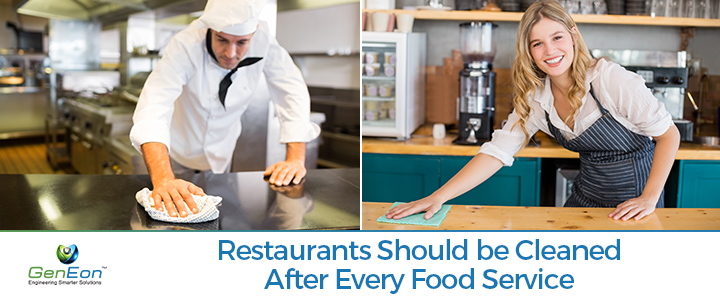Imagine walking into a restaurant, ready to enjoy a delicious meal. The ambiance is perfect, and the menu looks tempting.
But here’s a question: how clean is the kitchen where your food is prepared? You might not see it, but the cleanliness of a restaurant kitchen directly impacts the taste and safety of your meal. If you’re a restaurant owner or manager, maintaining a spotless kitchen isn’t just about meeting health regulations—it’s about ensuring your guests have a delightful and safe dining experience.
How often should you clean your kitchen to achieve this? The answer might surprise you and could be the key to your restaurant’s success. Dive into this article to uncover the secrets of optimal kitchen cleanliness and learn how it can transform your restaurant’s reputation.

Credit: boh.ai
Daily Cleaning Tasks
Maintaining a pristine kitchen is crucial for any restaurant aiming to deliver top-notch dining experiences. Daily cleaning tasks are the backbone of this effort, ensuring that cleanliness is never compromised. These tasks not only uphold health standards but also enhance the efficiency and safety of your kitchen operations. Consider how often you perform these daily rituals and ask yourself if there’s room for improvement.
Work Surfaces
Work surfaces are the heart of your kitchen, where creativity meets practicality. They’re the stage for slicing, dicing, and plating. Cleaning these areas daily is non-negotiable. Wipe down counters with a disinfectant to eliminate bacteria and food residues.
Think about the last time you cut vegetables. Did you notice how quickly bits of onion or tomato can scatter across the counter? Keeping them clean not only prevents cross-contamination but also keeps your prep work organized.
Cooking Equipment
Cooking equipment like ovens, stoves, and grills are the workhorses of your kitchen. Daily cleaning prevents grease and food buildup, ensuring optimal performance. A clean oven cooks food evenly; a clean grill leaves perfect sear marks.
Have you ever struggled with a clogged burner or a sticky grill grate? Regular cleaning can prevent these headaches and save you time during busy service periods.
Floors And Drains
Floors and drains can quickly become a breeding ground for bacteria if neglected. Sweep and mop floors daily to remove spills and food particles. Drains should be checked and cleaned to prevent blockages.
Imagine a slip on a greasy floor or a drain backup during peak hours. Addressing these issues daily keeps your kitchen safe and running smoothly.
Waste Disposal
Proper waste disposal is vital for maintaining a clean kitchen environment. Empty trash bins daily to prevent unpleasant odors and pest infestations. Sort and dispose of waste correctly to comply with local regulations.
Consider the impact of a forgotten trash bag. It can quickly become a source of foul odors, affecting the ambiance of your restaurant. Keeping waste management in check is a simple yet effective way to maintain hygiene.
Are these tasks part of your daily routine? If not, implementing them could transform your kitchen’s cleanliness and efficiency. A clean kitchen is more than just a requirement; it’s the foundation of a successful restaurant. How committed are you to maintaining this standard?
Weekly Cleaning Routine
Maintaining a clean kitchen is essential for any restaurant, ensuring both food safety and customer satisfaction. While daily cleaning is a must, a more thorough weekly cleaning routine can help tackle those hard-to-reach areas and prevent long-term grime buildup. Let’s dive into the specifics of what a weekly deep clean should include.
Refrigerators And Freezers
Refrigerators and freezers are the backbone of your kitchen, keeping ingredients fresh and safe. Each week, remove all items and wipe down shelves and walls with a solution of water and vinegar. This prevents mold and bacteria from growing where you store your perishables. Have you checked the door seals lately? Cleaning them ensures they maintain a proper seal, conserving energy and keeping your food at the right temperature.
Ovens And Grills
Ovens and grills see a lot of action, and this can lead to grease build-up. A weekly scrub with a mix of baking soda and water can work wonders in breaking down tough grime. Remember, a clean grill not only cooks better but also extends the life of your equipment. How often do you check the burners for clogs? Doing this weekly prevents uneven cooking and potential safety hazards.
Utensils And Small Appliances
Utensils and small appliances are often overlooked. Yet, they are crucial in your day-to-day operations. Take time each week to sanitize blenders, mixers, and other small gadgets. This helps prevent cross-contamination and ensures everything runs smoothly during busy times. Have you ever considered organizing your utensils by type? It can save valuable seconds during a rush.
Storage Areas
Storage areas can quickly become cluttered and dusty. Set aside time each week to tidy up dry storage and pantry spaces. Organize items by category and date to keep your inventory easy to navigate. A clean storage area not only looks professional but also reduces the risk of pests finding a home in your restaurant. What changes can you make to your storage layout to improve efficiency?
By sticking to a weekly cleaning routine, you not only maintain a high standard of hygiene but also create a more efficient and pleasant environment for your staff. Remember, a clean kitchen is a happy kitchen.
Monthly Deep Cleaning
Monthly deep cleaning is crucial for maintaining a restaurant kitchen’s hygiene. It tackles areas that aren’t cleaned daily. These tasks ensure the kitchen remains safe and efficient.
Ventilation Systems
Ventilation systems play a vital role in kitchen safety. They remove smoke and odors. Monthly cleaning prevents grease buildup. Grease can become a fire hazard. Regular cleaning improves air quality. It also helps in maintaining equipment efficiency.
Walls And Ceilings
Walls and ceilings can harbor grime and bacteria. Monthly deep cleaning removes stains and splatters. Focus on corners and high-touch areas. Clean surfaces improve the kitchen’s appearance. It also ensures a healthier environment for staff.
Pest Control Measures
Pest control is a key aspect of kitchen hygiene. Deep cleaning disrupts pest habitats. Inspect for signs of infestation. Address issues immediately. Regular cleaning reduces pest attraction. It protects food safety and reputation.
Lighting Fixtures
Lighting fixtures collect dust and grease. Clean them monthly for better illumination. Improved lighting enhances food preparation. It also contributes to a safer workspace. Clean fixtures create a welcoming atmosphere.
Seasonal And Annual Tasks
Seasonal and annual cleaning tasks are crucial for maintaining a restaurant kitchen. These tasks ensure safety, efficiency, and compliance with health standards. They often involve deeper cleaning and maintenance. Focusing on these areas keeps the kitchen running smoothly all year round.
Fire Safety Equipment
Regular checks on fire safety equipment are essential. Inspect fire extinguishers and ensure they are within their expiration dates. Clean and maintain hood suppression systems. Verify that emergency exits are clear and accessible. Schedule these tasks seasonally to prevent fire hazards.
Plumbing And Drainage Systems
Plumbing maintenance prevents costly repairs. Inspect pipes for leaks or blockages every season. Ensure drains are unclogged and grease traps are cleaned. A smooth plumbing system is vital for a clean kitchen environment.
Inventory And Supply Check
Regular inventory checks avoid wastage and overstocking. Conduct these checks at least once a season. Review supply levels and expiration dates. Organize storage areas to ensure easy access and rotation of stock.
Professional Cleaning Services
Hire professional cleaning services for deep cleaning tasks. Schedule them annually for floors, walls, and ceilings. Professionals can also tackle hard-to-reach areas. Their expertise ensures thorough cleaning and sanitation.
Health And Safety Compliance
Maintaining a clean restaurant kitchen is crucial. Daily tasks include wiping surfaces and mopping floors. Weekly, deep clean ovens and refrigerators to ensure safety. Regular cleaning prevents bacteria growth and ensures food safety compliance. Keep your kitchen spotless to meet health standards.
Maintaining health and safety compliance in a restaurant kitchen is crucial for ensuring the well-being of both customers and staff. A clean kitchen is not just about aesthetics; it’s about adhering to strict standards that prevent foodborne illnesses and ensure a safe working environment. Regular cleaning routines, informed by clear health and safety guidelines, can make a significant difference in achieving these goals. But how often should these tasks be undertaken, and what are the key areas to focus on?Local Health Regulations
Understanding local health regulations is essential. Each region has specific requirements for restaurant cleanliness, often dictating how frequently certain areas should be cleaned. These regulations are designed to minimize health risks and ensure that food is prepared in a safe environment. Have you checked the latest guidelines from your local health department?Employee Training
Proper employee training is the backbone of maintaining a clean kitchen. Staff should be well-versed in cleaning procedures and aware of the importance of hygiene standards. Regular training sessions can reinforce the importance of cleanliness and compliance. Are your employees equipped with the right knowledge and skills?Cleaning Products And Tools
The right cleaning products and tools can make or break your cleaning routine. It’s not just about using soap and water; specific cleaning agents are needed to tackle different areas of the kitchen. For example, degreasers for cooking areas and sanitizers for surfaces. Do you have the right arsenal to keep your kitchen spotless?Record Keeping
Keeping records of your cleaning schedules is not only good practice but often a requirement. Documenting when and what has been cleaned helps ensure consistency and accountability. It also provides valuable insights during health inspections. Is your record-keeping up to date and easily accessible? A restaurant kitchen’s cleanliness is a non-negotiable aspect of its operation. Regular cleaning, guided by health and safety compliance, safeguards your business and reputation. By focusing on regulations, training, proper tools, and record-keeping, you can ensure a hygienic environment that meets all necessary standards. So, are you ready to audit your kitchen’s cleaning practices?
Credit: www.sparklymaidmiami.com
Best Practices For Efficiency
Restaurant kitchens should be cleaned daily to maintain hygiene and safety standards. Regular cleaning prevents food contamination and pest infestations. Deep cleaning should occur weekly to ensure all equipment and surfaces are spotless.
Maintaining a pristine kitchen is the backbone of any successful restaurant. But how often should you roll up your sleeves and dive into cleaning? Efficiency is key. It’s about balancing frequency with best practices that keep your kitchen spotless without wasting precious time. Imagine running a well-oiled machine where every task is anticipated and executed seamlessly. Dive into these best practices for efficiency to ensure your restaurant kitchen remains sparkling and safe.Scheduling And Checklists
Creating a schedule is your roadmap to cleanliness. Think of it as setting a rhythm for your team. Daily, weekly, and monthly tasks should be clearly defined. A checklist acts like a compass, guiding you through each task without missing a beat. Consider breaking down tasks into time blocks. This prevents overwhelm and ensures every corner gets attention. What tasks are best done during slower business hours? Use that time wisely.Team Responsibilities
Assigning responsibilities is like orchestrating a symphony. You want harmony, not chaos. Clearly defined roles prevent overlap and confusion. When everyone knows what to do, efficiency skyrockets. Encourage ownership. When team members take pride in their tasks, the results shine. Have you ever noticed how a job well done inspires others to step up their game?Quality Control
Quality control is your safety net. It catches small errors before they become big problems. Regular inspections ensure standards are met consistently. Picture a guest peeking into your kitchen—what would they see? Implement feedback loops. Your team should feel comfortable reporting issues, knowing they’ll be addressed promptly. How do you handle feedback to continually improve?Sustainability Efforts
Sustainability isn’t just a buzzword; it’s a necessity. Efficient cleaning practices should also be environmentally friendly. Use eco-friendly products that protect your kitchen and the planet. Consider waste management. Reduce, reuse, and recycle. How can your cleaning practices contribute to a greener future? A sustainable kitchen is a responsible kitchen. Efficiency in cleaning isn’t just about being fast; it’s about being smart. How will you transform your cleaning routine into a powerhouse of productivity and sustainability?
Credit: www.geneontechnologies.com
Frequently Asked Questions
How Often Should Kitchen Floors Be Cleaned?
Kitchen floors should be cleaned daily to prevent slips and maintain hygiene. Spills and debris can accumulate quickly, leading to unsanitary conditions. Regular cleaning helps avoid pest infestations and ensures compliance with health regulations. A clean floor also enhances the overall ambiance and safety of the restaurant environment.
What Is The Best Time To Clean Kitchen Equipment?
The best time to clean kitchen equipment is after closing hours. This ensures thorough cleaning without disrupting operations. Regular cleaning prevents food contamination and extends equipment lifespan. Deep cleaning should be scheduled weekly or bi-weekly. This practice helps maintain hygiene standards and enhances the efficiency of kitchen operations.
How Frequently Should Kitchen Exhaust Fans Be Cleaned?
Kitchen exhaust fans should be cleaned monthly to prevent grease buildup. Grease can cause fires and reduce ventilation efficiency. Regular cleaning ensures proper airflow and removes odors. Professional cleaning might be necessary depending on usage intensity. Keeping exhaust systems clean helps maintain a safe and comfortable kitchen environment.
Why Is Daily Cleaning Important For Restaurant Kitchens?
Daily cleaning is vital for maintaining food safety and hygiene standards. It prevents cross-contamination and pest infestations. Regular cleaning also complies with health regulations and enhances customer trust. Clean kitchens boost employee morale and efficiency. Overall, daily cleaning ensures a healthy, safe, and welcoming environment for staff and patrons.
Conclusion
Keeping a restaurant kitchen clean is vital. Regular cleaning ensures safety. It prevents food contamination. Daily tasks should include wiping surfaces. Weekly deep cleaning is essential. Scrub floors and sanitize equipment. Monthly checks are crucial too. Inspect exhaust systems and storage areas.
Cleanliness is a team effort. Everyone should know their role. Train staff properly to maintain standards. A clean kitchen builds trust. Customers feel confident. They know food is safe. Your reputation depends on it. Consistent cleaning schedules make a difference.
Protect your restaurant’s image. Keep hygiene a top priority.

As the chief content writer, Hassan Al Sarker works as a professional kitchen-based content creator at Kitchen Liker.
In addition to reviewing the content published on Kitchen Liker, he ensures that it is accurate, relevant, and helpful. As a result, all the reviews and information published at Kitchen Liker are neutral and userfriendly.
Hassan Al Sarker has a bachelor’s degree in Hotel and Tourism Management From the Newyork University. Before joining Kitchen Liker, he was a contributor at Kitchen Club, United States.
